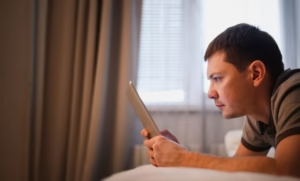Dealing with anxiety can make it tough to get things done. It’s like your brain is buzzing with worries, making it hard to focus on tasks. But it doesn’t have to mean your work suffers. Learning how to manage these feelings is key to keeping your productivity up, even when anxiety is present. This guide looks at ways to handle anxiety so you can be more productive.
Key Takeaways
- Understand how anxiety affects your ability to concentrate and complete tasks.
- Develop daily routines and self-care practices that support consistent productivity.
- Implement strategies to stay focused and manage tasks effectively when experiencing anxiety.
Managing Anxiety for Enhanced Anxiety Productivity

Anxiety can feel like a constant hum in the background, making it tough to get things done. It often makes focusing on tasks feel like trying to catch smoke. For people in Texas, Washington, California, Iowa, and New York, understanding how anxiety affects your ability to be productive is the first step. Polished Mind Psychiatry recognizes that anxiety isn’t just about worrying; it can manifest as racing thoughts, physical discomfort, and a general sense of unease that drains your energy. This can make even simple tasks feel overwhelming.
Understanding the Impact of Anxiety on Productivity
When anxiety takes hold, it can really mess with your ability to concentrate. Your mind might jump from one worry to another, making it hard to stick with a single project. This can lead to procrastination, missed deadlines, and a general feeling of not being good enough. It’s like your brain is on overdrive, but not in a helpful way. The constant mental chatter can be exhausting. It’s important to remember that this isn’t a personal failing; it’s a symptom of anxiety. Many people find that writing down their worries can help process them, rather than letting them swirl around endlessly. This is one of the many strategies discussed for managing workplace anxiety.
Strategies for Maintaining Focus Amidst Anxiety
Keeping your focus when anxiety is high is a skill that can be learned. Simple techniques can make a big difference. Breaking down large tasks into smaller, more manageable steps can make them feel less daunting. For instance, instead of thinking "I need to write this report," try "I will write the introduction paragraph." Taking short breaks for physical movement, like a quick walk or some stretching, can also help reset your mind. Deep breathing exercises are another effective tool; they can calm your nervous system and bring you back to the present moment. These methods are practical ways to manage anxiety at work and maintain your well-being. If you’re finding it consistently difficult to manage these feelings, seeking professional help is a good idea. You can explore options for online anxiety treatment, which offers flexibility and accessibility. Consider booking an appointment at Polished Mind Psychiatry to discuss personalized strategies.
It’s common for anxiety and depression to occur together. Recognizing the distinct feelings associated with each, like fearing the future versus feeling stuck in the past, can guide you toward the right support.
Online therapy can be a great way to get support without the hassle of travel, fitting treatment into your life more easily. It’s a flexible approach that uses various communication methods and tools to help you build coping skills. This kind of support can be integrated into your daily routine, making progress more achievable. When looking for online care, check for certified therapists and secure communication options.
Cultivating Productive Habits with Anxiety

When anxiety is a regular part of life, building routines that support productivity can feel like a big challenge. It’s not about forcing yourself into a rigid schedule that doesn’t fit, but rather creating a flexible framework that acknowledges your mental state. For people in Texas, finding that balance is key. Think about structuring your day in a way that works with your anxiety, not against it. This might mean breaking down larger tasks into smaller, more manageable steps. For instance, instead of aiming to write a whole report, focus on completing just the introduction or gathering the necessary data. This approach helps prevent that feeling of being overwhelmed.
Structuring Your Day for Success
Creating a daily structure can provide a sense of control when anxiety makes things feel chaotic. Here are a few ideas:
- Time Blocking: Allocate specific blocks of time for different tasks, including breaks. Be realistic about how long things will take.
- Task Batching: Group similar tasks together. For example, answer all emails at a designated time rather than checking them constantly.
- Prioritization: Use a simple system, like the Eisenhower Matrix (Urgent/Important), to decide what needs your attention most.
It’s also helpful to build in buffer time between tasks. This gives you a moment to reset and transition, which can be really helpful when dealing with anxiety. Remember, consistency is more important than perfection. If you miss a planned activity, just get back on track with the next one.
Building habits when you have anxiety isn’t about being perfect; it’s about being persistent. Small, consistent efforts add up over time, creating a more stable foundation for your day.
If you’re finding it hard to establish these routines or manage your anxiety symptoms, seeking professional guidance can make a significant difference. You can book an appointment with us to discuss personalized strategies.
Leveraging Self-Care for Sustained Productivity
Self-care isn’t a luxury; it’s a necessity, especially when managing anxiety. Integrating self-care practices into your routine can help maintain energy levels and improve focus. Think about what genuinely helps you relax and recharge. This could be anything from a short walk outdoors to listening to calming music. Regular physical activity is also a powerful tool for managing anxiety symptoms. Even a brief period of movement can help clear your head and reduce tension.
Consider these self-care strategies:
- Mindfulness and Breathing Exercises: Simple techniques like deep breathing can calm your nervous system quickly. Exploring coping strategies can provide immediate relief.
- Adequate Sleep: Prioritizing sleep is vital for cognitive function and emotional regulation.
- Healthy Nutrition: What you eat impacts your mood and energy levels. Aim for balanced meals.
- Scheduled Downtime: Make sure to schedule time for activities you enjoy, completely unrelated to work or productivity.
It’s important to remember that managing anxiety and improving productivity is a journey. There will be good days and challenging days. The goal is to build sustainable habits that support your well-being over the long term. If you’re struggling with stress management or finding it difficult to implement these strategies, reaching out for support is a sign of strength. Polished Mind Psychiatry is here to help you find effective ways to manage both ADHD and anxiety, creating a more balanced and productive life. You can book an appointment to get started.
Feeling worried can make it tough to get things done. But you can learn ways to build good habits even when you’re anxious. Small steps can lead to big changes. Want to find out how? Visit our website for tips and support.
Moving Forward with Confidence
Managing anxiety while trying to stay productive is a real challenge, but it’s definitely not impossible. By trying out different strategies, like breaking tasks down, taking short breaks, and being kind to yourself, you can find ways to get things done without feeling overwhelmed. Remember, progress isn’t always a straight line, and that’s okay. If you’re finding it hard to manage anxiety and its impact on your daily life, reaching out for professional help can make a big difference. Practices like Polished Mind Psychiatry offer personalized care and telehealth options, making it easier to get support. Taking that step can help you build confidence and find a better balance.
Frequently Asked Questions
How can a person with anxiety handle a large project or task?
When feeling anxious, it’s helpful to break down big tasks into smaller, more manageable steps. Focusing on one small part at a time can make the overall job seem less overwhelming. Also, try setting a timer for short work periods, like 25 minutes, followed by a brief break. This can help you stay on track without getting too stressed.
What are some good self-care practices for someone with anxiety?
Self-care is really important when you’re dealing with anxiety. This means doing things that help you relax and recharge, like getting enough sleep, eating healthy foods, and moving your body. Even short breaks for deep breathing or a quick walk can make a big difference in managing anxious feelings and staying productive.
Does Polished Mind Psychiatry offer online appointments for anxiety support?
Yes, Polished Mind Psychiatry offers telehealth services, which means you can get mental health support from the comfort of your home. They have licensed professionals who can help you manage anxiety and improve your overall well-being. You can learn more and book an appointment on their website.




